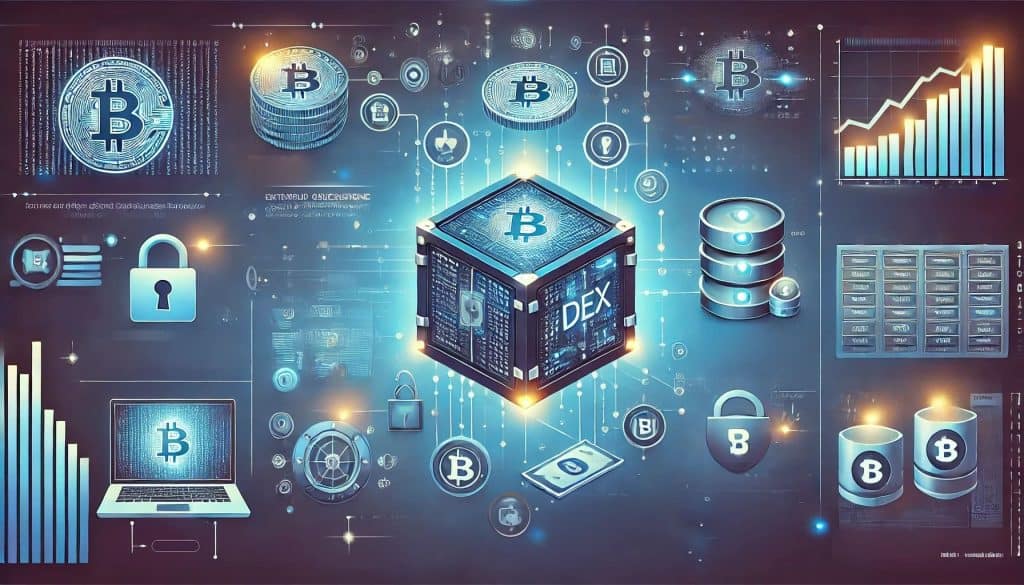Cryptocurrency trading has evolved significantly since the advent of Bitcoin, and one of the most groundbreaking developments in this space is decentralized exchanges (DEX). Unlike traditional centralized exchanges (CEXs), which rely on a central authority to facilitate trading, DEX operate without intermediaries, providing a more secure and private trading environment. In this article, we’ll take a look at what DEX are, how they work, and why they’ve become an integral part of the cryptocurrency ecosystem in June 2024.
What is a decentralized exchange (Dex)?
Decentralized exchanges (DEX) are peer-to-peer marketplaces where trades occur directly between cryptocurrency traders. DEX allow users to trade cryptocurrencies without having to entrust their funds to a broker or custodian. This approach contrasts with centralized exchanges (CEXs), where a third party manages the trading process and retains ownership of the assets.

Benefits of using Dex:
Security
Because users maintain control of their private keys and funds, Dex is less vulnerable to hacks and security breaches.
Privacy
Dex often improves privacy by asking for less personal information from users.
Censorship resistance
Without a central authority, Dex is less subject to censorship and restrictions.
How do dex work?
Decentralized exchanges utilize smart contracts to facilitate direct transactions between users’ wallets. Here’s a breakdown of the process
- Create an order: Create a trade order that specifies the amount and type of cryptocurrency the user wants to trade.
- Order matching: The Dex platform matches orders with orders from various users.
- Execute: If a match is found, the smart contract executes the transaction, transferring cryptocurrency between the user’s wallets.
Popular Dex Platforms in June 2024
The decentralized exchange landscape has grown with numerous platforms offering unique features. Here are some of the most popular DEX:
| Dex Platform | Unique features | Trading volume (24 hours) |
|---|---|---|
| Uniswap | Automated Market Maker (AMM) | 1.2 billion dollars |
| SushiSwap | Yield farming and staking options | 800 million dollars |
| PancakeSwap | Low fees, powered by Binance Smart Chain | 600 million dollars |
| Curve Finance | Optimized for stablecoin trading | 500 million dollars |
| Balancer | Customizable liquidity pools | 400 million dollars |
To better understand how decentralized exchanges work, see the following descriptions:
Key differences between Dex and CEX
While both Dex and CEX platforms enable cryptocurrency trading, they operate differently and offer distinct advantages and disadvantages.
| Features | Decentralized Exchanges (Dex) | Centralized exchange (CEX) |
|---|---|---|
| Funds custody | Users retain control of their funds. | Funds are held by the exchange. |
| Regulations | Less likely to comply with regulatory requirements. | More likely to comply with regulatory requirements. |
| Liquidity | Liquidity is typically low because there are fewer users and trading pairs. | It offers higher liquidity due to more users and trading pairs. |
| Anonymity | Identify less stringent customer requirements. | You need a comprehensive know-your-customer for every user. |
| Security | Users can control their private keys, which increases security. | More vulnerable to hacking due to centralized storage of funds. |
| Censorship resistance | Reduce the risk of censorship by operating without a central point of failure. | Vulnerable to government regulation and censorship. |
| User Experience | It can be less user-friendly, especially for beginners. | They are generally more user-friendly with customer support. |

Pros and cons of using dex
Prose:
- Security: Enhanced security with user control over funds.
- Privacy: Greater privacy with the least amount of personal information needed.
- Decentralization: Reduced risk of censorship and restrictions.
Cones:
- Liquidity: Liquidity is often low compared to centralized exchanges.
- User experience: Can be less than user-friendly, especially for beginners.
- Transaction speed: Potentially slower transactions.
How to choose the right dex

Choosing the right decentralized exchange (dex) is crucial for a smooth and secure trading experience. Here are some detailed considerations to help you make an informed decision:
Security features
Reputation: Research the dex’s history and reputation within the crypto community. Look for past security breaches and how they were handled.
Smart contract audit: Ensure that Dex has undergone a comprehensive smart contract audit by a reputable security firm. The audit will help identify and mitigate potential vulnerabilities in the platform’s code.
User control: Ensure that the dex allows you to maintain control of your private keys and funds throughout the transaction process.
Fees
- Trading fees: Compare trading fees between different dex platforms. Some DEX charge a flat fee per trade, while others may charge a percentage of the trade amount.
- Gas fees: Gas fees (transaction fees) can vary greatly, so consider the blockchain network your dex operates on. For example, an Ethereum-based dex may have higher gas fees compared to Binance Smart Chain or other networks.
- Withdrawal fees: Check if there are any fees associated with withdrawing funds from Dex to your personal wallet.
Supported cryptocurrencies
- Variety: Make sure the dex supports a wide variety of cryptocurrencies, especially the ones you want to trade. Some DEX specialize in specific types of tokens, such as ERC-20 tokens on Ethereum or BEP-20 tokens on Binance Smart Chain.
- Token list: Find platforms that frequently list new and emerging tokens to provide more trading opportunities.
User interface
- Ease of use: A user-friendly interface can greatly enhance your trading experience, especially if you’re new to decentralized exchanges. Look for a platform with an intuitive design and easy navigation.
- Learning resources: Some DEX offer educational resources, tutorials, and customer support to help users better understand the trading process and platform features.
Fluidity, fluency
- Trading volume: High liquidity means you can execute trades faster and with less price drop. Check the daily trading volume of a dex to gauge its liquidity.
- Liquidity pools: Some DEX encourage users to provide liquidity through yield farming or liquidity mining programs. These can improve liquidity and provide additional earning opportunities.
Community and support
- Engage with the community: An active community can provide valuable insights, support, and updates about Dex. Stay informed by participating in forums, social media groups, or the platform’s official channels.
- Customer support: While many DEX don’t offer traditional customer support, some do offer support through community channels or dedicated help sections. Make sure you have a way to get help if you need it.
Additional features
- Staking and yield farming: Some DEX may offer additional features such as staking, yield farming, and liquidity mining to provide additional income opportunities.
- Cross-chain compatibility: Look for DEX that support cross-chain trading so that you can seamlessly trade assets across different blockchain networks.
Conclusion
Decentralized exchanges (DEX) have revolutionized the way cryptocurrencies are traded by providing a secure, private, and censorship-resistant alternative to centralized exchanges. As we move further into 2024, dex adoption is expected to continue to grow, driven by demand for safer, more autonomous trading solutions. Whether you’re an experienced trader or a newcomer to the crypto space, understanding the workings and benefits of DEX is crucial to navigating the evolving landscape of digital assets.
Key takeaways
- A dex, or decentralized exchange, is a cryptocurrency exchange where transactions occur directly between users without intermediaries.
- It uses Dex smart contracts to facilitate peer-to-peer transactions directly between users’ wallets.
- DEX are generally more secure because users maintain control of their private keys and funds.
- Benefits include increased security, better privacy, and decentralization.
- Popular dex platforms include Uniswap, SushiSwap, PancakeSwap, CurveFinance, and Balancer.
Mention
- Coinbase. What is Dex?
- Gemini. A Guide to Decentralized Exchanges (Dex).
- Cointelegraph. How does Dex work?
- Coin market capitalization. Top Dex Rankings.
- CoinGecko. Decentralized exchanges.
